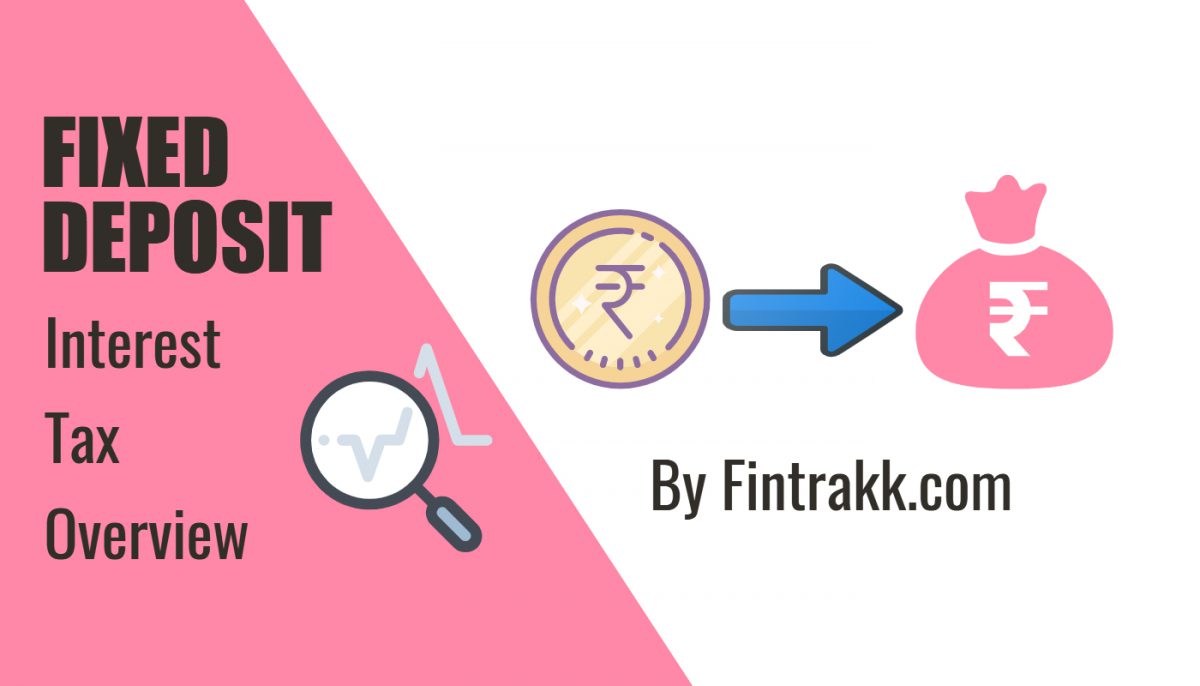FIXED DEPOSITS or FDs are one of the most common methods of investing your hard earned money since decades. Not you, not me, Fixed Deposit is the evergreen choice of majority of Indians for parking their funds.
So, here we are to discuss all about Bank Fixed deposits, FD Interest, Tax on FD and much more…..Just keep reading…..
No matter how many other alternatives for investing you have, but each one of you might surely be having a Fixed deposit with you.If not, some of you might be planning to put your funds in a Fixed Deposit. Right!
What is a Fixed Deposit?
Fixed Deposit is a financial instrument that provides the opportunity to invest your money for a particular period of time and you earn fixed interest over your invested amount. You can open a Fixed Deposit in a bank and enjoy a fixed rate of return based on the type of Fixed deposit and the tenure for which FD has been made.

Interest on Fixed Deposit
The FD Interest rates are higher as compared to a normal Savings account. A normal savings account can give you around 4% interest rate per annum but FD can fetch you much higher interest ranging 7-8% p.a. generally.
So, investors who want to play extremely safe without taking any kind of risk usually find Fixed deposit as the best mode of investing their money.
The period of Fixed deposit can vary from few months to years as per the banking norms and your requirements. The normal interest rates fall between 7-8% p.a. But, these can be higher or lower as per your FD selection, tenure of FD and other banking norms.
Also, have a look at Fixed Deposit Interest Calculator
Tax on Fixed Deposits:
The interest on Fixed Deposit is always chargeable to tax i.e. FD interest is fully taxable in your hands.
People normally get confused at this point assuming that interest is exempt upto Rs.10000. This is applicable only in case of Interest earned on Savings account and not on Fixed deposits.
So, one more thing to remember here is, that Tax deduction Under Section 80 TTA is for Interest on Savings account only and not for Interest on Fixed deposits.
However, Banks deduct TDS @ 10% in case the FD interest exceeds Rs.10000 during a financial year(provided your PAN is available). So, if your interest is lower, no TDS shall be deducted. However, banks are authorized to deduct TDS@20% if PAN is not furnished.
Also, banks deduct tax on fixed deposits as and when interest is accrued and not when it is paid. TDS amount is shown in your Form 26 AS. So, it is always wise to pay tax on yearly basis and not when the FD matures. It is quite possible that when your FD matures,you might fall in a higher tax slab and thus end up paying higher taxes on the lump sum amount.
Further, Interest on FD forms part of your “Income from other sources”. This income forms part of your total income. You have to show the same in your Income tax return.
Some,people try to avoid tax by making Fixed deposits in different bank accounts to keep the FD interest below Rs.10000. You can avoid TDS but you can’t avoid paying tax on the overall interest if applicable.
Also go through our famous blog post: Tax saving FD – one of the popular tax saving options!
How can you save tax on interest earned on Fixed Deposits or FD?
You can save tax on Fixed deposits only in the following cases:
1. If you don’t have any other taxable income: So, if FD interest is your only income and it is upto Rs.250000 (for individuals below 60 years) or Rs.300000 (for senior citizens) or Rs.500000 (for super senior citizens) as per Individual slab basic exemption limits.
2. If you have other income but your total income is not taxable: If your total income is below the basic tax exemption limits, then also you are not liable to tax.
In such cases, you can submit Form 15G or Form 15H so that there is no deduction of TDS by banks. In case bank has deducted TDS, you can claim refund.
Hence,following are the correct steps to be followed while considering your FD Interest Income:
1. Firstly add the Total Interest Income on all the Fixed Deposits (even if in different banks)under the head “Income from other sources”.
2. Calculate your tax liability based on your Total Taxable Income. The tax is calculated on your total taxable income as per the Income tax slab rates.
3. Then you can claim the Tax deducted at source(TDS) by the banks and reduce your tax liability.
4. Pay the tax on the differential amount if applicable (as per Individual slab rates).
So, if your bank has deducted tax @ 10% but, while calculating your taxes at the year end, if you fall in the higher tax bracket say 20% or 30%(which is quite possible) then you will have to pay taxes at higher rate.
Also have a look at Fixed Deposit Double Scheme
You don’t have any choice but to show your entire interest income. There is no scope of evading tax as all the bank accounts are linked to your Permanent Account Number(PAN).
You also have to provide details of all your active bank accounts in the Income tax return forms (ITR).
So, you need to disclose all your incomes may it be in the form of Interest on Savings account or Interest on Fixed deposits. Feel free to give your valuable feedback or any queries thereon in our comment section below!

I got a non bank FD for 10 lakhs at 9.5% interest rate in November 2018. Can I claim any deduction on a non bank FD? This FD matures after 5 years. Also, as I might be getting annual return sometime in November 2019 only. So, do I still have to include accrued interest in “income from other sources”? How do I calculate accrued interest?
Also, it may be that the Company will deduct tax at source (TDS). So, if I too pay accrued interest, will I not end up paying more tax? When actual interest is deposited in my bank after one year in Nov 2019 then my bank also will deduct tax on it. So, will I not end up paying tax on the same amount, even though bank saving amount will be at lesser percentage? Please suggest.
Can we take accrued interest income in subsequent year on actual receipt? Please reply.
Very useful post. Thanks a lot!
Hi, You wrote”The interest on Fixed Deposit is always chargeable to tax i.e.FD interest is fully taxable in your hands.People normally get confused at this point assuming that interest is exempt upto Rs.10000.This is applicable only in case of Interest earned on Savings account and not on Fixed deposits.However,Banks deduct TDS @ 10% in case the FD interest exceeds Rs.10000 during a financial year”.Kindly clarify whether interest from FD is exempted if its below Rs.10000.
Hi Ananth, Interest on FD needs to be included in your total income while calculating your tax.It is not exempt. Its just that banks are authorised to deduct TDS on interest above Rs.10k only.The tax deduction Under Section 80TTA upto Rs.10k is on savings account interest only. The correct way is to add up your total interest income from FD and savings account both.Then include it in “Income from other sources” in your ITR. Claim deduction under Section 80TTA if applicable.Calculate the net tax after reducing the tax that has already been deducted by banks in the form of TDS.
Hi,
My monthly income is just Rs.16000
Please let me know which account should I open.
Should I go for FD,RD or Demat??
Hi,Your investing is based on your actual savings,finance goals,how much risk you can afford and for how long you want to invest your money.At this point,you are earning a salary of Rs.16000 so taking very high risks and investing in stocks might not prove to be a wise decision.So,firstly you should plan and invest in safer options rather than opening a Demat account.
Safe options that give fixed returns could be FDs,RDs,PPF etc.These won’t fetch you high returns but security of money is there.If you can afford some risk, you can go for mutual funds.For further details you can check our post http://fintrakk.com/5-best-long-term-investment-options-in-india/ Slowly and gradually when you increase your earnings and savings,you can go for other investment options.
Everything is very open with a really clear explanation of the challenges.
It was really informative. Your site is useful.
Thanks for sharing!
Please clarify further.You are saying your wife is a partner in your firm,she might be already having a share in capital.
If you want details on gifts you can refer our blog post http://fintrakk.com/received-gifts-worried-about-its-taxability/
Also our contact is support@fintrakk.com
Hi my name is Deven I have my own textile trading firm , in which me my wife is partner . She is a house wife I want gift my half capital amount to her .
Is it possible ?